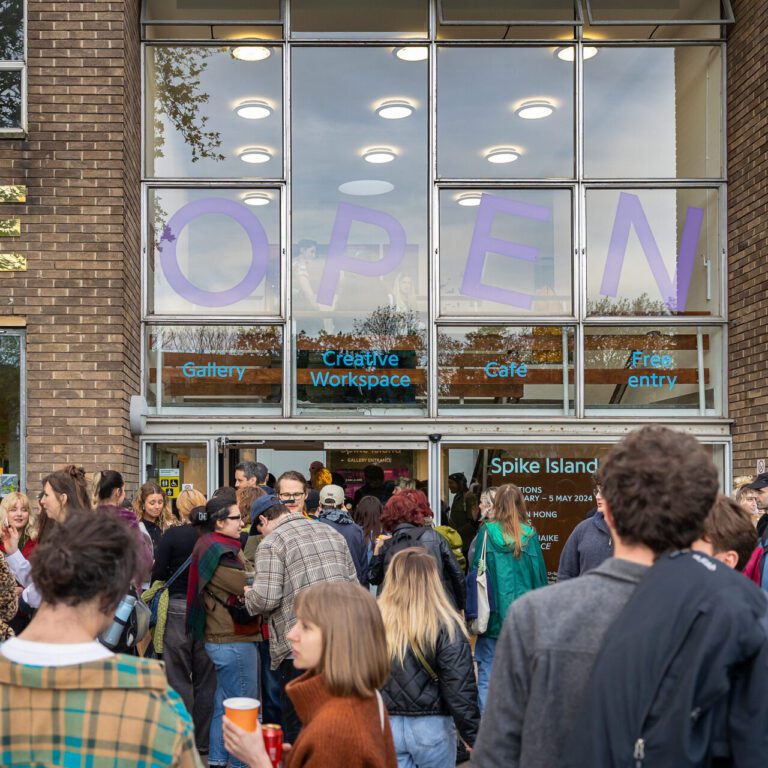Climate Action Programme Case Study: Spike Island
In this case study Jo Kimber, Operation’s Manager at Spike Island, talks about their environment commitments and Green Futures Programme, as they work towards their target of cutting their carbon footprint by half by 2036 and reaching Net Zero in the 2040s.
A contemporary art production and exhibition space, Spike Island have recently been awarded the Active Member Status of the Gallery Climate Coalition in recognition of them taking meaningful action to reduce their climate impact. With ambitious initiatives put in place addressing energy efficiency and production, exhibition materials and transport, waste, and employee engagement, we are also thrilled to be able to welcome them as a member of Bristol’s Climate Leaders group.
Actions across the scopes
As part of our decarbonisation strategy, we focused our initial efforts on reducing our scope 1 and 2 emissions by replacing and insulating our roof, alongside installing an array of 202 photovoltaic (PV) solar panels (information about scope emissions can be found here). Given the age and energy inefficiency of the original building structure, this first climate action enabled us to tackle energy costs while also contributing to Spike Island’s emission reductions.
Alongside seeing a reduction in energy bills, between March 2025 – August 2025, 6,000 Kilograms of CO₂ emissions were saved – the equivalent of planting 386 trees or the electricity used by three average UK homes for a year. This is just the first stage in our larger site retrofit, with the overall aim to improve energy efficiency, reduce heat loss by 50%, and transition to green energy sources.
We prioritised local suppliers and contractors wherever possible, to support the Bristol community and to reduce travel related scope 3 emissions, connected to both contractors and materials.
As an active arts space, Spike Island has extended our boundaries of influence beyond our building and energy infrastructure with a strong focus on each exhibition’s environmental impact across materials, transport and production. Actions we are carrying out include:
- Material circularity drive, with all new material used for an exhibition required to be reused in a future project or shared with other organisations and initiatives. This includes printed materials and posters, which often find a new lease of life in community art programmes.
- Switching to an environmentally friendly waste company, diverting all waste from landfill.
- Pledging to prioritise sea freight wherever possible when moving artworks for exhibitions and encouraging visiting artists to do the same. Artwork related travel is one of the biggest emission sources for this sector.
- Exploring the possibility of introducing a green quota for artists. Currently we talk with artists about prioritising reusable and sustainable materials.
Staff and community engagement
In our Commitment to the Environment, we have set out to “empower our staff, tenants, and audiences to take climate action through education, resources, and collaborative initiatives”.
Key to achieving this was by establishing a cross-departmental Green Team to ensure that everyone has an active voice and are represented in developing sustainability action plans that support environment commitments and the community. Spike Island is more than just our paid staff, and this is reflected in the Green Team, with representatives also including resident artists and commercial tenants.
In addition to the Green Team, there are a lot of smaller clubs that people can get involved in so they can feel connected to our green work while contributing to an area that meets their interest and passions, such as gardening clubs.
Other steps we are taking to engage staff and promote positive behaviour change include:
- Placing visual educational materials across the building and drawing attention to the positive changes that are taking place, such as the PV on the roof.
- Securing senior leaderships support. The Director of Spike Island flags items to the sustainability team.
- Completing Climate Literacy training to educate staff in-house on the importance of climate action.
Alongside promoting sustainable practices for artists to adopt to help reduce their scope 3 emissions, we have made a commitment to host one exhibition a year focused on sustainability. We believe in the power of contemporary art to confront pressing social issues, including climate justice. These exhibitions provide the space to expand climate engagement to the wider Bristol community.
Top tips and reflections
- When engaging staff, remain future focused and positive. Make space for fear and overwhelm but work to overcome these emotions by highlighting the manageable and tangible actions we can take that will make a difference.
- Work with local people where you can, this will support with reducing supply chain emissions and can help save money in the long run.
- Staff wellbeing is paramount to securing internal support. When carrying out physical projects, consider where disruptive additions, such as potentially noisy inverters, are placed.
- Keep going and stretch your net wide when applying for funding opportunities. Establish a positive relationship with your funders and make them feel valued for their support. For example, at Spike Island we invite funders to all our events so that they can see how their contribution has been used.
- Take courses to understand the work you are planning to carry out, the issues at hand and the actions that need to be taken. For example, I am currently undertaking a retrofitting course.
- Remember to budget and factor in any maintenance costs, such as cleaning solar panels and bird proofing, and have an established contingency plan with emergency funds set aside.
Through our Climate Action Programme collaboration with the Bristol Business Improvement District, we’re keen to showcase climate progress and create more opportunities for businesses to learn from one another.
If you have an initiative or project we can shout about, please do get in touch with jasmine@bristolclimatenature.org
Share to
